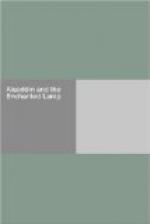[FN#584] I suppose the verb which I render “caused [sleep] get the mastery,” to be ghelleba, ii of gheleba, as the only way of making sense of this passage, though this reading involves some irregularity from a grammatical point of view. This, however, is no novelty in the present text. Burton, “But whoso weareth head hard by the headsman may not sleep o’nights save whenas slumber prevail over him.”
[FN#585] Zeczekeh, a word which exactly renders the sparrow’s dawn-cheep.
[FN#586] Lit. “From (as Fr. des) the deep or remote dawn” (min el fejri ’l ghemic, Syr. for emic), cf. Matthew Arnold’s “Resignation ;” “The cockoo, loud on some high lawn, Is answered from the depth of dawn..”
[FN#587] The terminal formula of the dawn-prayer.
[FN#588] i.e. the magician
[FN#589] Lit. “bride’’ (arouseh). She is always, to the end of the tale, spoken of as Alaeddin’s " bride,” never as his “wife,” whilst he, in like manner, is called her “bridegroom” (arous).
[FN#590] This, at first sight, appears a contradiction, as we are distinctly told (see ante, p. 207) that the princess was unaware of the properties of the lamp; but the sequel shows that she had learned them, in the mean time. from the magician himself. See post.
[FN#591] Ifrikiyeh.
[FN#592] Night DLXXXI.
[FN#593] Lit. “a spit (ric) of sweet.” We may also read reic or reyyic, “the first part of anything” (especially “the first drop of rain").
[FN#594] Lit. “having changed the clothes of this my dress.”
[FN#595] i.e. taking effect the moment of its administration.
[FN#596] Night DLXXXII.
[FN#597] Because white wine would have been visibly troubled by the drug.
[FN#598] Ishebi bi-surrihi (lit. “drink by his pleasure or gladness;” surr or surour). Burton, “Pledge him to his secret in a significant draught.”
[FN#599] Kasein thelatheh, lit. two cups three (unusual way of putting it).
[FN#600] Reshoush (for reshash), “anything sprinkled,” i.e. powder or drops. I translate “powder,” as I find no mention in the Nights of the use of this narcotic in a liquid form.
[FN#601] Takkeltu, lit. “I have conceived in my mind.” Sir R. Burton is apparently inclined to read tallectu by transposition, as he translates, “I depend upon thy say.”
[FN#602] Night DLXXXIII.
[FN#603] Lit. “I will not delay upon thee.”
[FN#604] Lit. “Thou hast burdened or incommoded thyself” (kellefta khatiraka), see previous note, p. 120, {see FN#340} on this idiomatic expression.
[FN#605] Ana atebtu mizajaka, lit. “I have wearied thy temperament.”
[FN#606] Lit. “pleasure” (surr), see ante, p. 223, note 2. {see FN#598}
[FN#607] Or “playing the boon-companion.”
[FN#608] Syn. “equivocal, a double entente.”




